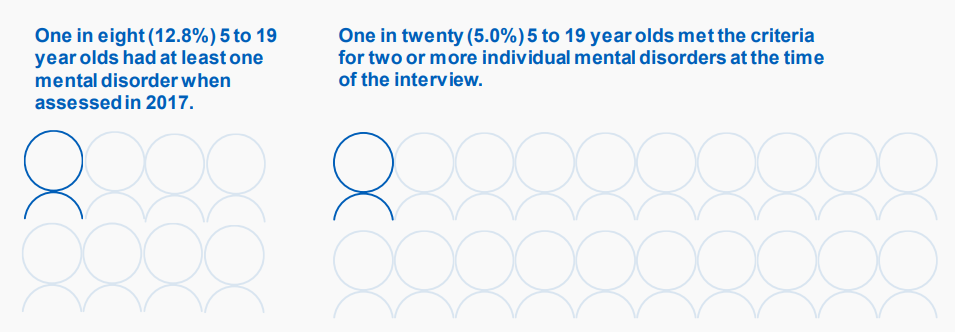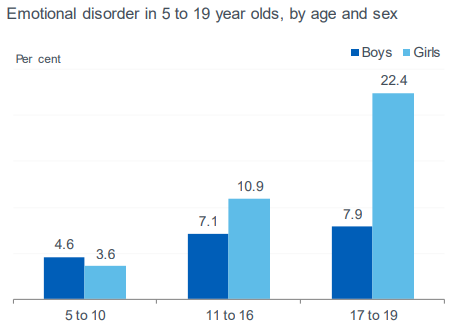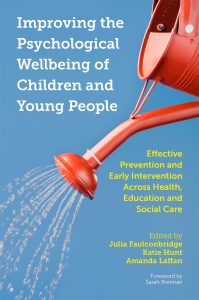
The NHS Digital report on this survey of the mental health of children and young people in England was published on 22nd November 2018 and is the first time since 2004 that we have had an authoritative national prevalence study. This study also looked for the first time at pre-school children and at the transition to adulthood by looking at 17-19 year olds.
It is important to note that this survey is only reporting on the most severe difficulties; those that fit the criteria for psychiatric disorders according to the International Classification of Disease (ICD-10). It is inevitably, therefore, an underestimate of the amount of distress that children and young people are experiencing in our society where many difficulties do not fit psychiatric criteria but would be considered to be psychologically significant and impacting on their developmental progress.
Some headlines of the survey are:
- That there has been an increase in overall rates of mental disorder from 9.7% in 1999 to 10.1% in 2004 and now to 11.25%. This is mainly accounted for by an increase in the prevalence of emotional disorders in both boys and girls. The figures for behavioural, hyperactivity and others like autistic spectrum disorders have remained fairly stable over time.
- That prevalence seems to increase with age from 6.8% of 2-4 year olds to 12.2% of 5-10 year olds to 14.3% of 11-16 year olds. For girls this increase continues into the 17-19 year old age group with a prevalence rate of 23.9% of mainly emotional disorders, whilst for boys it decreases somewhat to 10.3%
These figures make for very sobering reading especially when coupled with the problems of access to help and the finding that 24.1% of these children and young people with the most severe difficulties are getting no formal or informal help at all.

The figures should lead to a very serious examination of what is happening in our society that so many of our children and young people are experiencing these life changing difficulties and what we can do to improve the picture for the next generation. Simply increasing services to help is not the answer, we need to address the causes and make the changes needed for many more children to grow into adulthood with greater psychological well-being and resilience.
Our recently published book Improving the Psychological Wellbeing of Children and Young People: Effective Prevention and Early Intervention Across Health, Education and Social Care discusses the evidence for the causes of psychological difficulties and mental health problems and, most importantly, shares both the theoretical and practical evidence for what can be done to make a real difference in the future.
The new survey provides more evidence to back up the arguments in the book. For example:
- The impact of poverty and social inequality. The rates of emotional disorders more than doubles going from highest to lowest income families
- Adverse Life Events, low levels of social support and parental mental health problems were all associated with higher levels of mental disorder
- The interaction between poor physical health, disability and developmental difficulties was clearly demonstrated. 71.1% of children with a mental health disorder had a physical health or developmental disorder and 35.6 % had recognised special educational needs
The time has come to stop wringing our hands and to start acting on the evidence to create a psychologically healthy world for all our children. The book calls for a whole new vision, with a new understanding of how we view psychological interventions that go way beyond the individual to the family, community and society as a whole and it shows how this process can be started.
Commentary by Julia Faulconbridge, Consultant Clinical Psychologist and Chair of British Psychological Society’s Division of Clinical Psychology
 ‘A sea change is underway, and this exciting new book both rides that wave, and offers an exciting vision of how things may progress. It invites us, as a society, to consider what it would mean to have a model of child services designed to help children to grow up to have greater psychological wellbeing, rather than directing the majority of resources to trying to help after things have gone wrong. Using clear language, evidence from research and specific examples of best practice, this book is certain to become one of those volumes that defines an era, both capturing the zeitgeist and offering inspiring visions of what the future might look like.’
‘A sea change is underway, and this exciting new book both rides that wave, and offers an exciting vision of how things may progress. It invites us, as a society, to consider what it would mean to have a model of child services designed to help children to grow up to have greater psychological wellbeing, rather than directing the majority of resources to trying to help after things have gone wrong. Using clear language, evidence from research and specific examples of best practice, this book is certain to become one of those volumes that defines an era, both capturing the zeitgeist and offering inspiring visions of what the future might look like.’
– Dr Nick Midgley, Child Attachment and Psychological Therapies Research Unit (ChAPTRe), UCL and the Anna Freud National Centre for Children and Families
If you would like to read more articles like this and get the latest news and offers on our mental health books, why not join our mailing list? We can send information by email or post as you prefer. You may also be interested in liking our Social Work, Mental Health and Health Care Facebook page.